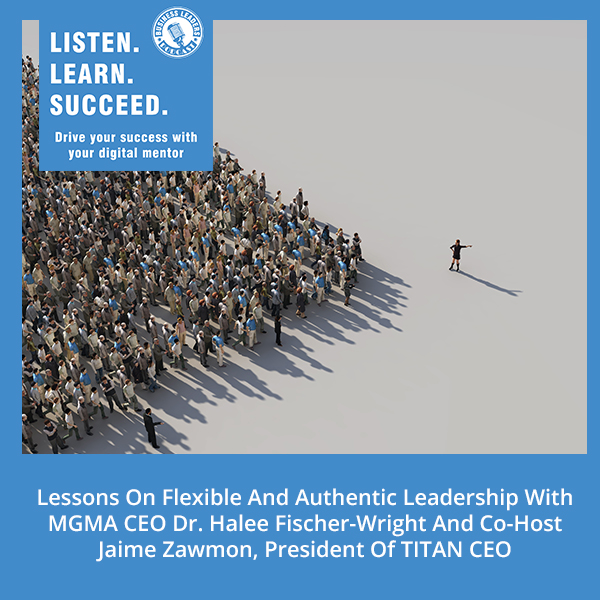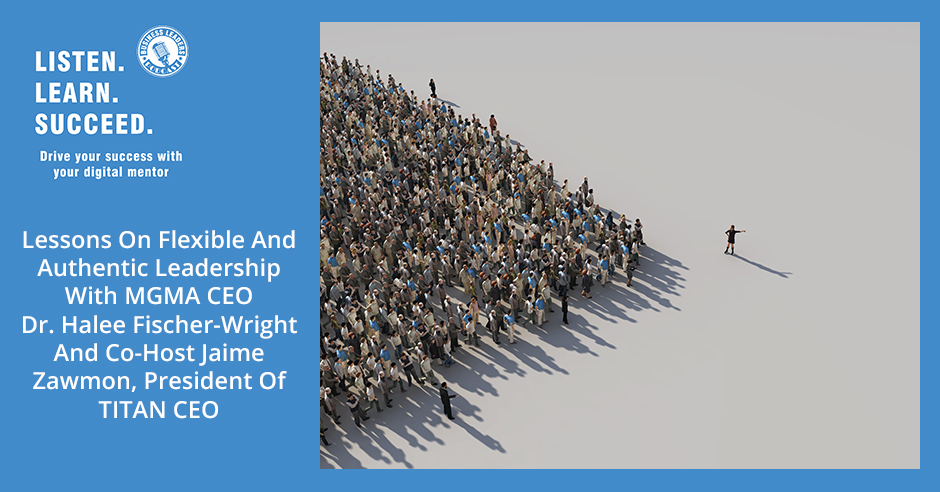Lessons On Flexible And Authentic Leadership With MGMA CEO Dr. Halee Fischer-Wright And Co-Host Jaime Zawmon, President Of TITAN CEO


For the past 94 years, the Medical Group Management Association (MGMA) has been leading in the business of medical practice management, currently representing almost three-quarters of the medical practices in the United States. Even well-entrenched organizations such as this has to change with the times, however – a task that MGMA has been able to fulfill with flying colors for the past four years under the leadership of its President and CEO, Dr. Halee Fischer-Wright. This exemplary leadership has caused her to be selected as a Titan 100 for 2020. Join in as she shares her personal take on leadership in this conversation with Bob Roark and his co-host, Jaime Zawmon, the President of TITAN CEO.
—
Watch the episode here:
Lessons On Flexible And Authentic Leadership With MGMA CEO Dr. Halee Fischer-Wright And Co-Host Jaime Zawmon, President Of TITAN CEO
We’re extremely fortunate. We have Jaime Zawmon. She is the Founder and President of Titan CEO. We also have Dr. Halee Fischer-Wright. She’s the President and CEO of Medical Group Management Association, MGMA. Jaime, Halee, thank you for being on the show.
Thank you, Bob.
First off, congrats on being selected as a Titan 100. Tell us a bit about MGMA, what’s it about and who do you serve?
We’re a 94-year-old organization and the largest healthcare association focused on business of medical practice management. We represent over 60,000 members and more importantly, we represent 15,000 group medical practices, which is almost three-quarters of the medical practices in the United States. We represent everyone from the tiny practices like family doctors in rural communities to the national large health systems. We touch almost 350,000 physicians across the United States in a variety of specialties.
We’re in the background of almost all healthcare delivered at the front line. What we do is we work closely with medical practice leaders to help them solve their business challenges so they can focus on what matters, which is providing outstanding care for their patients in communities. In this day and age, that means now. We also provide and what we’re known for in our industry is the gold standard and benchmarking for compensation and medical practice cost surveys. We advocate on behalf of our members on national regulatory and policy issues. We take it from the top at the federal government level all the way down to the doctor seen patient in a room.
It’s such a steady, non-regulatory, not changing industry especially now.
Halee, I have to say I’m excited that you’ve been recognized as part of the Titan 100 for 2020. As those of you may or may not know reading, we have published a copy of the Titan 100 book in which Halee was profiled in. We’ll talk a little bit more about how you can read her profile. I always like to start our show, as you know this platform recognizes Colorado’s top 100 CEOs and C-level executives 100 Titans of Industry. I always like to ask every Titan that we interview in this show, what characteristics they believe that it takes to be considered a Titan of Industry?
Once again, thank you for the honor of being a Titan 100. Now more than ever, especially given the challenges and changes as we’re going through this global pandemic. Flexibility is someone like myself and the Titan 100 community has to have. As I’ve read through the book, all of my colleagues that are Titans have shown that as well. Some of those characteristics include, and we’ve talked about this with Jaime before, having the ability to alter your original plan of action. This is what I find has benefited our organization the most in the last several months is actively seek out a situation from many different perspectives because this isn’t business as usual. As a physician, I’m often wrong, but never in doubt.
Flexibility is a hallmark of an industry titan and there’s no way that you can be flexible unless you're willing to listen to other people. Click To TweetI’ve often changed my mind o even solidified my decision-making when I’ve taken into account the different viewpoints and different perspectives. I’ve found that invaluable. Finally, this is something I work on every single day. Some days better than others is listening to others. There’s no way that you can be flexible unless you’re willing to listen to other people. As leaders and as Titans within our own industries, we practice flexibility. Keeping in mind that listening is probably the most powerful tool that we have being able to alter our course, but in our listening, we can help others alter their course as well to benefit our organizations.
You put it into great context there. Listening is the most common trait when we’ve asked the Titans that stands at the forefront of their mind. I love that you talk about seeking a perspective from many different individuals especially during this time. Profound thoughts around characteristics of a Titan.
We were talking a little bit beforehand about your journey from med school to here. It seems like to me that there’s a common thread that comes from you started in med school to where you are here and perhaps if you could expand on it that would be great.
I’m a Colorado native, part of the community, born at Rose Hospital. I grew up in Littleton. I went to the University of Colorado for undergrad. One of the things being in medicine that you learn is you’re competing against everyone all the time. In other words, for me to do well and to achieve my goals getting into med school, I had to do better than everybody else. You had that competitive spirit all the way through. Even in med school to get the residency, you want you have to be competitive and to get the job that you want outside of it. My leadership journey started when I started my own business with a partner of mine, who now is a physician within the Denver health system. I realized that always being in competition wasn’t going to lead me to where I wanted to be.
I had my midlife crisis early when I was 35. I had this epiphany. It was right before 9/11. I was seeing 40 kids a day. I had a practice in Lakewood. We were successful. At 35, I thought, “I could be doing this same thing day in, day out for the next 40 years.” Not a whole lot may change. The science may change, but the fundamentals, what I’m doing right now, won’t shift. The whole reason I went into med school was because I wanted to make an impact. I wasn’t going to be able to make an impact in the way that I wanted to make an impact, a much bigger impact. I started thinking about as a little pediatrician in Lakewood, Colorado, how am I going to be able to move the world in a positive way?
To paraphrase the Archimedes quote, “Business is the lever arm to move the world.” That’s when I started pursuing business education. From there, it was a completely asynchronous career. I became a business consultant. I was the president of a large physician group at Rose Hospital. I was practicing and then doing all those multiple things led me on the path that led me to leadership. It started from two points, which is it wasn’t aligned with my personal values to continue to compete for the rest of my life. The other one was I wanted to make an impact.
That’s a good succinctly put parentheses around a lot of activity. You also were an author as well along the way.
I was a partner in a boutique consulting firm in Los Angeles, which was a very unique experience. It colors my leadership. It’s one of those things that when I was a consultant, it was great. You pop in, you would bestow your knowledge, then you disappear and you weren’t held accountable. After a couple of years of that, I thought to myself, “I don’t like that. I want to stick around and see what the results are.” Problem-solve through the challenges, which is what pushed me into leadership positions.
I have to say, Halee, it takes a lot of courage to do what you did back when you were working at the practice to stop and check yourself and say, “Am I aligned with my passions? Am I aligned with the vision that I want for my life?” What advice could you offer others that maybe were in that same mode that you were where you were seeing 40 patients a day and to have that courage to take that step?

MGMA CEO: Resting on 94 years of doing business as usual is not the way to get to the future.
Some of this is generational. I’m a Gen X-er. The recognition was I wasn’t happy. I was the first person to go to college. Neither one of my parents went to college. I don’t have physicians in my family. For my family, they thought that being a physician was the pinnacle of success. What I found personally was when I got “there” I wasn’t satisfied because I wasn’t aligned with my values. It was challenging for my husband, my family, for me to make that choice. It is that a Shakespearian quote of, “To thine known self be true.” I wasn’t happy. I knew that doing what I was doing wasn’t going to make me happy and that I put so much effort and energy into being a physician, but there had to be a better way to leverage my education and my experience to do something for the greater good.
That was my driver. That’s relatively unique for a Gen X-er. The Baby Boomers think I’m nuts and the Millennials were like, “So what?” Millennials are like, “What took you so long? You practiced for nineteen years.” It’s somewhat of a generational shift. A lot of what makes approach unique for someone that is my age is unique generationally, but it’s not unique as we watch some of our Millennials come into leadership positions. I see that same type of creativity, drive and a sense of wanting to connect to something bigger. I tend to bucket it in generations.
How I discuss this with Baby Boomers my parents’ age is different than I discussed with my colleagues that are my age, which is like, “You can get your sports car at middle age. I went to business school to each his own.” I used to be a clinical instructor for the University of Colorado and they stopped sending me residents because the first question I’d ask is, “Are you happy doing this? Can you see yourself doing this for the rest of your life? If not, let’s talk about what does make you happy and how can you channel what you’re doing into something that would be fulfilling and allows you to follow your passions,” which is the advice and coaching that I received along the way.
Jaime, we were talking a little bit before in particular, Halee, all of this background has led you up to a larger institution, serving a great deal of the medical community in the United States. Along the way with everything else you’ve got going on, you guys got issued I don’t know how many generations event with COVID. How does an organization like yours adapt, adjust and serve your constituents with this being issued to you?
One of the reasons I was hired for MGMA is I thought that I was leading the organization through a realignment. What I didn’t recognize is we needed a complete transformation. In a certain way, the last four years was the setup to put all the pieces into place to navigate this global pandemic. We preceded our global pandemic by taking the organization through change process. I have to be honest in saying, it’s been painful. To the point that I will even be honest enough to say that I had a dream about one of my initial executive team that I loved, but we encouraged them to move on to pursue their own pathway. As we went through this phase of change, we knew that they weren’t the right person to lead through that change.
I’m still a few years in. I still thinking about it, wondering what I could do better, how we could have changed this. The preceding few years are what set us up because we knew that resting on 94 years of doing business as usual was not how we were going to get to the future. Bob, what I’ve been saying for the hundreds of interviews I’ve done for the last several months is there is nothing that we’re experiencing in COVID that weren’t trends that preceded COVID, but the acceleration is in such a way that we all have motion sickness because it’s been such high velocity.
I have to ask while we’re on this topic then, what advice can you share or insight into other business owners that are leading through this pandemic as well?
It’s what I’ve learned while being at MGMA. My first position is CEO. Although I wouldn’t have admitted it the day I came in, not having the experience of a CEO does color your perception. The commitment I made to myself is I’d be authentic. As a physician, there’s a perception of how you should be as a physician. As a business consultant, there’s a perception of how you should be as a business consultant. When you write books and you’re promoting your book, there’s “the author.”
It’s your mistakes that will make you an outwardly successful and inwardly happy person, not your successes. Click To TweetWhen I went into MGMA, I decided that I would be myself. If that worked great and if not, as I crossed into middle age while I’ve been in this position, it was the gift that I could give myself is to allow myself to be authentic as a leader. That authenticity is what I’m looking for in people that I bring into the organizations, looking for in people we do business with. It’s the piece of advice. The only way that you’re going to be able to sustain and thrive is if you are authentic in your leadership. That’s why I always probe on, are you passionate? Are you excited? Are you engaged? If you’re not, is that something we can find, or is that something that we can explore as time goes on? That’s the biggest piece of advice is. Where I’ve been the most miserable is when I have the role of being the doctor, the author or the consultant and not my goofy self. Giving myself permission to understand that I have strengths and weaknesses. That’s part of leadership as well. It has been the most important transformation in my leadership style for many years.
We talked about this a little bit before. We have the Halee of now and the Halee is confident and authentic. What advice would that particular Halee offer Halee of 20, 25 years ago to perhaps accelerate or fill in a blank that you wish you’d had?
I have soul searched around that question. What should I have done? Why I’ve gone to med school knowing that I’d be a CEO? Should I have been a hedge fund manager? Those questions that you ask yourself. I don’t regret any of the decisions that I’ve made. We talked about this when we did our CEO round table with Jaime. I still struggle occasionally with imposter syndrome. When I first started, I was terrified that I was going to make mistakes. What I would tell the Halee twenty years ago is, “It’s okay to make mistakes. You will make mistakes.” Some of them will be egregious mistakes and you will learn from them in a way that you will never learn from your own successes. Embrace them if you can, which is very unsettling when you’re young. I would embrace the mistakes. It’s your mistakes. For me, the advice I’d give my younger self is it’s the mistakes who’ve made me the outward success and the inwardly happy person that I am and not the successes.
As we sit here and listen to you, Dr. Halee, it’s no question that you are incredibly humble and authentic. You’ve given us such a nice purview into your world. I’d love to know what are your passions outside of being the CEO of such an amazing organization.
My interior life is creative and very asynchronous from what I do in my day job. I love cooking. I love to travel and I don’t mean business travel. Business travel is you get to point A to point B back to point A. When my husband and I travel before the pandemic, we’d go to Europe and then what I collect are textiles because I’m very kinesthetic. I love touching things. In my home office now, I have textiles from Italy, England, and Germany. I love using that.
Once a year, my husband has agreed to let me do a walkabout. I’ll usually go to England or to Italy and go on an adventure, hire a guide. I did that once with an antiquing adventure in England and met amazing people. I meet these amazing people and they become part of my extended family. Through them, I invested in a technological platform for antiques, which has done well during COVID. Through that family, I have all these contacts and we get these great adventures. It’s food, travel, wine and creativity. The other part of me is that I also write, not business writing. I have a fantasy of being JK Rowling in my 50s. I’m working on that. What I find is when I engage in my creative, not healthcare world, not business leadership, I end up in my other creative brain informing my business brain. They feed each other.
I like to do road trips. I get a lot of windshield time. On the windshield time, I’ll be listening to a book or I’ll be listening to learn something. It seems like things come together. It’s very similar.
I went on what I call walkabouts. I went to England. I landed, took a train, met this lady who runs an alpaca farm. I stayed at her farm, which is in this national park in England. I met with the alpaca. She also has these animals called Guanaco, which is out of South America. I met them. She has a complete knitting agency or business. I stayed at the farm. It’s not in my domain of experience as living in Central Denver. I took a train and went to Bath, England. One of my friends who is in the antiquing business spent time with her in her garden, her dogs. I went into Central London. I attended a business event and then went up to Scotland. I went to a textile place where they make most of the tartans for Scotland and for the world. That’s a pretty typical walkabout experience for me.
We wanted to be respectful of your time and so we’re coming to a close, Jaime, any thoughts?

MGMA CEO: The only way that you’re going to thrive is if you are authentic in your leadership.
I wanted to say thank you for being on the show. for those of you that are reading, if you would like to learn more about Halee’s journey, her story, you can visit www.Titan100.biz and read all of the profiles of Colorado’s top 100 CEOs and C-level executives. You can also download a copy of the digital-book there as well.
Halee, for the people that would like to find you on social media, where do they find you?
It’s @DrHalee. It’s LinkedIn and Twitter.
Is there a question we should have asked you that we didn’t that you’d like to leave us with?
The only thing that you didn’t ask me is, what is the most important thing about leadership? It’s not about us as leaders. It’s about developing others. As I mature in my leadership and I’m always trying to learn more, where I spend more and more of my energy is developing others. I’m less concerned about myself, much more interested and see it as the future of the organization and our future to develop the people that are on our teams. If we’re going to have a leadership conversation, that’s the only thing that we missed.
That would be another episode. I was thinking about your metaphors of fabric. I think about the threads of your life contributing to the fabric that you and that’s an awesome journey. A little bit of alpaca fabric thrown in there. Thank you for your time. Jaime, anything else you’d like to add?
It’s been amazing learning a little bit more about your journey, Halee. The things that you hit on with regards to embracing the change and following your passions. Your travels have clearly inspired you in so many different ways. It’s awesome to see how it’s been blended into your life. It’s been profound.
Thank you both. This has been a great conversation.
Thanks, Halee, for the privilege of your time. Take care.
Important Links:
- Titan CEO
- Medical Group Management Association
- Titan 100
- Titan 100
- www.Titan100.biz
- @DrHalee – LinkedIn
- Twitter – Dr. Halee Fischer-Wright
About Halee Fischer-Wright
 My passion to help people led me to become a physician. Today, that same passion drives my work as a healthcare leader, organizational strategist, a bestselling author, and a speaker. I have spent the past 16 years becoming an expert in culture, turnarounds, and medical management innovation. I helped grow a healthcare group to 560 physicians and a best-in-class ranking. I guided a regional hospital to improve operations and outcomes. And I have coached executive teams in Fortune 100 companies on leadership development and high-performance teams. Along the way, I earned an MA in medical management from USC’s Marshall School of Business, a certificate in executive coaching from Georgetown University, and a Fellowship in the American College of Medical Practice Executives.
My passion to help people led me to become a physician. Today, that same passion drives my work as a healthcare leader, organizational strategist, a bestselling author, and a speaker. I have spent the past 16 years becoming an expert in culture, turnarounds, and medical management innovation. I helped grow a healthcare group to 560 physicians and a best-in-class ranking. I guided a regional hospital to improve operations and outcomes. And I have coached executive teams in Fortune 100 companies on leadership development and high-performance teams. Along the way, I earned an MA in medical management from USC’s Marshall School of Business, a certificate in executive coaching from Georgetown University, and a Fellowship in the American College of Medical Practice Executives.
Now, as CEO of the Medical Group Management Association, which represents practices and groups that deliver more than half of the healthcare in America, I am leading a traditional healthcare association into greater influence, thought leadership, and member value with a renewed focus on its mission: to lead meaningful transformation in healthcare.
I am the author of the national bestseller Back to Balance and coauthor of the New York Times bestseller Tribal Leadership with Dave Logan and John King. I have been recognized for my work by Modern Healthcare (included in Top 100 Healthcare Leaders and Top 25 Women in Healthcare) and by Becker’s Hospital Review (included in 100 Great Leaders in Healthcare), among other awards. I regularly speak on the challenges of the healthcare industry, creating cultures of excellence, innovation, and women’s leadership.
Specialties: Physician Leadership, Innovative Development, Executive Coaching, Clinical Operations, Leadership Education, Creation of High Performance Teams, Organizational Development, Strategy and Negotiations
Love the show? Subscribe, rate, review, and share!
Join the Business Leaders Podcast Community today: